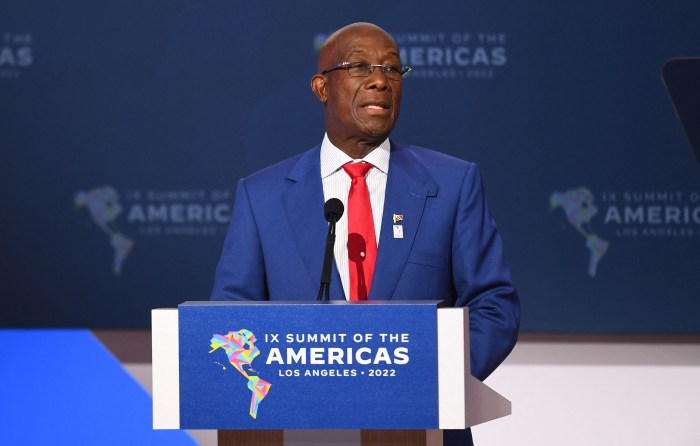Barbados
Barbados Prime Minister Frenduel Stuart has reassured Barbadians that the Caribbean Broadcasting Corporation (CBC) will not be privatized.
“Under the Frenduel Stuart administration there will be no privatization. Whatever influences are out there in the broadcast environment, the government of the day must have a say in setting the tone for what people see and what they hear,” he said during the recent St. Michael East and Central Branch meeting at Springer High School.
“We believe that there is a role for the government, the role of the state in certain areas of this economy and we believe that there is a role for the private sector, in certain areas of the economy. However, we are not getting rid of the CBC. Other players are coming into the market but CBC belongs to the government, like how the Transport Board also belongs to the government,” he pointed out.
Guyana
The Malaysian news agency has reported that a container from Guyana was intercepted with cocaine in coconut milk and that a Nigerian drug syndicate is believed to be behind it.
Bernama reported that Bukit Aman Narcotics CID Director Datuk Noor Rashid Ibrahim said the tactic was foiled by the Selangor Customs Department after detaining the ship carrying a container of cargo in which a section contained drugs worth RM22 million.
“Based on information from the United States Drug Enforcement Administration (USDEA), the ship which arrived on Nov. 12 at Port Klang was filled with 980 cartons of cans containing coconut milk and pieces of pineapple.
“Sixteen cartons comprising 384 cans of coconut milk were identified as mixtures with 400 grams of cocaine in each can by the Chemistry Department,” he told a media conference, according to Bernama.
He said the container which originated from Guyana was to be sent to Mozambique with South Africa as a transit point to transfer the container into another ship.
Haiti
Haiti’s government has warned a group of soldiers that it will not tolerate any action aimed at disrupting law and order amid concerns the former soldiers were planning more public action to support calls for the establishment of a military in the French-speaking Caribbean Community (CARICOM).
A statement from the Ministry of Defense said it had word that the former soldiers were preparing to mount new public demonstrations, trying to pressure President Michel Martelly administration so they could “obtain undue privileges.”
In the past, the former soldiers and their supporters have paraded in public with mismatched camouflage uniforms, with some of them also carrying rifles and pistols.
The soldiers have been calling on President Martelly to honor his campaign pledge to restore the army that was disbanded in 1995, but the international community has warned that an army would not be in the best interest of a country still recovering from the devastation caused by a powerful earthquake in 2010 that killed an estimated 300,000 people and left more than a million others homeless.
Jamaica
The Jamaica Home Circuit Court has temporarily lifted the curfew order that was imposed on murder accused Ninja Man, whose real name is Desmond Ballentine. The waiver will expire on Jan. 7 next year.
Previously, a term of his J$2 million bail condition was that he be at home between 9:00 p.m. and 6:00 a.m. each night. But when the matter was raised in court recently, his lawyer Valerie Neita Robertson told Senior Judge Gloria Smith, that despite the variation in the bail condition, the restriction was affecting the earning potential of the artiste especially for the festive season.
The judge then decided to lift the order. The trial of the murder case against Ninja Man was also put off to May 13 next year.
St. Lucia
St. Lucians will soon benefit from a further reduction in the electricity tariff.
St. Lucia Electricity Services Ltd. (Lucelec) has announced that the pending reduction comes as early as US$300,000 is being made available by the light and power company for redistribution to customers, in accordance with the requirements of the Electricity Supply Act.
Under the Electricity Act, as amended in 2006, Lucelec is required to set aside 50 percent of profits above the company’s allowable rate of return each year to be redistributed to qualifying customers.
Electricity customers are identified by the Electricity Supply Act as “industrial and hotel consumers” and “consumers or groups of consumers in need of special protection” as determined by the minister of finance.
Lucelec communications officer Roger Joseph explained that the funds are distributed equitably among all qualifying customers and reflected as a reduction in the price the customers pay per unit each month until the poll of funds is used up.
Based on Lucelec’s financial performance for 2011, qualifying customers have been receiving a tariff reduction of approximately half a cent per unit each month.
The additional funds will effectively reduce what qualifying customers pay for electricity by nearly two cents per unit for the remainder of the year.
Trinidad
BP Trinidad and Tobago (BPTT) announced recently it had discovered an estimated one trillion cubic feet of gas off the coast of Trinidad and Tobago, doubling the estimated gas in place in the Savonetta gas field to two trillion cubic feet.
BPTT made the announcement during a recent meeting in London, which was attended by T&T’s Energy Minister Kevin Ramnarine and T&T’s High Commission to London, Garvin Nicholas and other BP representatives.
The gas well discovered began production in October 2012, and if successful the two additional development wells are also expected to be brought into production over the next 18 months.
BPTT President Norman Christie said: ‘This is exciting news for both bpTT and the industry since this represents the largest discovery for BPTT since 2005.”
Prime Minister Kamla Persad-Bissessar said the Savonetta 4 discovery will no doubt aid the arrest in the decline of natural gas reserves.’
In a statement, she said: “We are advised that this is BP’s largest discovery in Trinidad and Tobago in seven years and the largest discovery of natural gas in Trinidad and Tobago since 2007. This discovery augurs well for confidence in the Trinidad and Tobago economy.”
Barbados
The International Monetary Fund managing director Christine Lagarde has suggested to Barbadian authorities that a devaluation of the Barbados dollar would make the country’s tourism more competitive and help its economy to grow.
According to a recent press statement issued by the Central Bank of Barbados (CBB), this suggestion was made to the bank’s governor Dr. DeLisle Worrell when he attended a recent breakfast meeting with the IMF and the president of the World Bank.
However, the island’s chief economist shut down the IMF’s head suggestion, pointing out in the statement, “To most of us in the Caribbean, it does not seem rational to impoverish yourself to grow your economy. To us, it is obvious that is what devaluation implies.”
Haiti
Former U.S. President Jimmy Carter recently visited Haiti to help build homes in a town hit by the devastating January 2010 earthquake.
Carter and his wife Rosalynn led a mission of hundreds of Habitat for Humanity volunteers in the south-western town of Leogane. The town was the epicenter of the earthquake.
Many people there still have no home or live in terrible conditions. The former president and former first lady took an active part in the construction of 100 one-room houses on about 14 acres of land. Families will get to live in the homes rent-free for five years and then will have to pay a modest annual rent to the government.
Trinidad
The Trinidad and Tobago Government has removed the 15 percent Value Added Tax (VAT) from more than 4,000 selected food items.
Prime Minister Kamla Persad-Bissessar said the VAT removal was just one of the measures to help reduce food prices.
She also promised to remove the CARICOM duties on food as part of the ongoing bid to reduce prices.
Persad-Bissessar said the duty removal is a matter, which would affect CARICOM’s Common External Tariff (CET).
“Down the road, items like rice, flour and sugar are already zero-rated but because of the duties on them they tend to impact heavily on the consumer, but those are long-term measures, this was a short-term measure,” she said.
The prime minister said the next step would be for the Ministry of Legal Affairs and the Prices Council to keep monitoring so that this is not a one-shot and by tomorrow the prices have gone up again. The removal of VAT took place from Nov. 15. Alcohol has not been zero-rated.
Compiled by Azad Ali


























